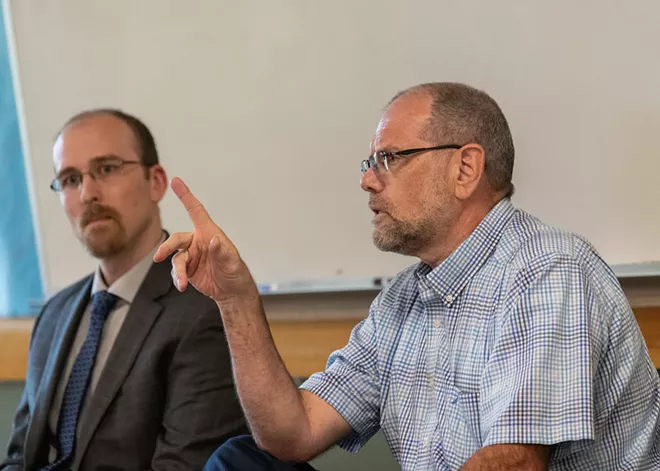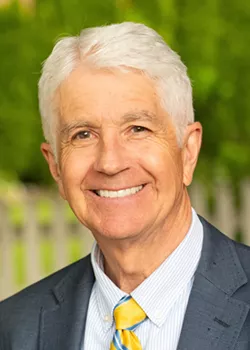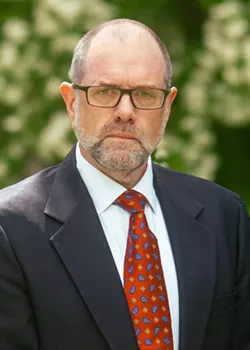Most election years, Superior Court judges don't face any opposition. All 13 Spokane County Superior Court judge positions are up for election every four years. This year, 11 of the 13 judges are running uncontested and have already won by default.
For Superior Court Judge Position 8, incumbent Judge Marla Polin is facing one candidate, Brandon Casey. That race will be determined by the general election ballot on Nov. 5.
But for Superior Court Judge Position 11, incumbent Judge Timothy Fennessy faces three challengers: Superior Court Commissioner Jerry Scharosch (pronounced "sharsh"), Washington state Court of Appeals senior staff attorney Andrew Van Winkle, and former Spokane County deputy prosecutor F. Dayle Andersen.
Fennessy originally said he would retire this year, but decided to seek re-election in the middle of filing week in May.
Fennessy's critics claim that he is dismissive in court, offending attorneys and participants in sensitive cases such as sexual assault or domestic violence incidents. His supporters, including many on the Superior Court bench, say Fennessy brings much needed experience and a "brilliant" legal mind to the court.
All four candidates will be on the primary election ballot due on Aug. 6. Only the top two candidates will advance to the general election in November.
EARLY CHALLENGERS
It's difficult for any outsider to unseat a sitting judge, though that's exactly what Fennessy did when he won the 2016 election against former Judge Greg Sypolt.Andersen says he is running to "make a statement," claiming that he and other attorneys have felt "belittled" and "humiliated" in Fennessy's courtroom. Andersen quit his job with the Spokane County Prosecutor's Office on April 11, after an incident where he says a supervisor verbally abused a female coworker and the office retaliated against people who reported it. Newly out of work, Andersen decided to run to unseat Fennessy because of his experiences with the handful of cases he tried in front of Fennessy in 2020 and 2021.
"With Judge Fennessy, I felt that there was a personal anger or animosity that I couldn't explain," he says.
Andersen hasn't done any fundraising. He says he worries that anyone in the legal community who publicly supports him could face challenges in future work.
Van Winkle has no personal experience with Fennessy. But he points to public records he obtained (and the Inlander reviewed) that show more than 450 disqualifications against Fennessy from 2019 to 2024 as evidence that Fennessy is ineffective. That's more disqualifications than there were against the next four most frequently disqualified judges combined.
Attorneys can disqualify a judge if they don't think they are going to get a fair hearing. However, they don't have to give a reason why they are disqualifying the judge.
Scharosch used to be a prosecutor for the Special Assault Unit and began feeling concerned about Fennessy's demeanor and legal rulings. Scharosch started disqualifying Fennessy in 2020, and the entire unit started routinely disqualifying Fennessy soon after.
Fennessy says that judges have the responsibility to make sure attorneys are doing their job well.
"I believe that I exercise that responsibility," Fennessy says. "Clearly, there are disqualifications from the special assault unit. I do not know why. It's been said — I think in a rumor fashion — that I somehow don't have empathy for victims. I don't find that at all credible. ... There's a lot of reasons for disqualifications, and it's a raw number that somebody has thrown out. But I don't know what that number means."
Van Winkle originally filed to run against Judge Raymond Clary (Position 3), but he says he decided to challenge Fennessy after his advisers said they felt Fennessy was vulnerable.
Van Winkle wants to become a judge to help improve accommodations for navigating the court system. His mother has schizophrenia, and he says he has personally experienced how the courts, if made approachable, can be "gateways to treatment" for people who need help.
"They need the judges who are going to be on the bench to understand where they're coming from and where their family members are coming from," Van Winkle says.
JUDICIAL ENDORSEMENTS
Despite routinely disqualifying Fennessy, Scharosch says he didn't mean to run against him — he decided to run when he was under the impression that Fennessy was going to retire.Fennessy had announced to other judges in a weekly meeting in April that he wouldn't run for reelection. So Scharosch started asking sitting judges for their endorsements. He felt he would be a better judge than the other two candidates because of his experience as a court commissioner. In that role he already handles some of the same responsibilities as a Superior Court judge.
It surprised Scharosch when Fennessy announced his reelection campaign in the middle of filing week.
Fennessy says that he didn't decide to run again in reaction to any other candidate who filed, but in reaction to the outpouring of support he received when he announced his intention to leave.
"I got several calls from friends, several inquiries from current sitting judges, and most surprisingly and important to me, my daughter," Fennessy says.
Two years ago, Fennessy was elected by his peers to be presiding judge for the Superior Court. He says he realized he could offer valuable experience that most of the other judges, who are newer, still lack.
By the time Fennessy filed, Scharosch had put enough money into his campaign and received enough support that he decided to keep going, too.
Sitting judges typically "circle the wagons" around incumbent colleagues in reelection campaigns, Van Winkle says. But the endorsements by the sitting Superior Court judges are split between Scharosch and Fennessy.
All seven female judges have endorsed Scharosch, while the other five judges, all male, have endorsed Fennessy. Judge Dean Chuang has endorsed both candidates.
While some judges gave their endorsements before Fennessy announced his reelection campaign, Scharosch says that some decided to continue to support him after all four candidates filed.
At a panel hosted by the nonprofit People for Effective Government, Andersen and Van Winkle were asked what they thought the division of endorsements implied (neither Fennessy nor Scharosch attended the panel).
"I think it's a bad thing, period," Andersen responded.
"I think the split along gender lines is concerning," Van Winkle answered. "[However,] I don't mind saying bad things about Judge Fennessy, but not once have I heard anyone allege that he is sexist."
Judge Breean Beggs, who has endorsed Fennessy, says the split is coincidental.
"My observation of it was that people made commitments," Beggs says. "It's a little bit of an awkward situation [...] But my speculation is that if Judge Fennessy had announced earlier on that he was running, other judges probably would not have endorsed someone other than him."
As a lawyer, Beggs tried cases in front of Fennessy and was impressed with the judge's demeanor.
PRIMARY ELECTION
Ballots for the primary election must be postmarked no later than Aug. 6 or returned to official drop boxes no later than 8 pm that night.
For a list of drop box locations go to spokanecounty.org/187/Ballot-Drop-Box-Locations or your local election office's website.
Go to inlander.com/election2024 for more of our election coverage.
"I tried a trial with him for two weeks — a really challenging trial," Beggs says. "I lost in front of the jury but thought that he still handled the courtroom dynamic so well and so professionally and judicially. There was really a lot of conflict between the lawyers. It was brilliant."
None of the female Superior Court judges who were contacted were willing to respond on the record about their endorsement of Scharosch.
Scharosch also is endorsed by Spokane County Prosecuting Attorney Larry Haskell and the supervisors of the special assault and domestic violence units. He says that voters can decide for themselves what to think.
"Judge Fennessy has been practicing longer than I have," Scharosch says. "So if you're looking at experience alone, he does have longer practicing law. [But] I think that my character, my demeanor and my varied legal experience would be an asset. ... I tend to talk mostly about the facts and then let people draw their own conclusions."
"Commissioner Scharosch is doing a great job as commissioner, and I have no doubt that he will be a Superior Court judge someday," Beggs says. ♦
Correction: This story was updated on July 25 to correct a misspelling of Judge Breean Beggs’ first name.




